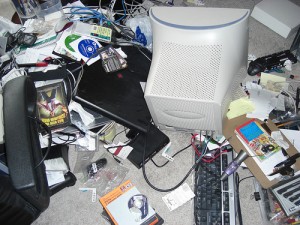With daylight savings time catching us by surprise, and the temperatures here in NYC hovering right around 50, it’s finally safe to say that spring has almost sprung. There go those lift-passes I hadn’t had time to use. Oh well. And with spring just about here, we will soon be inundated with the usual flood of “Spring Clean Your Computer!!” articles, in which overly-peppy reporters who can barely turn on

their Powerbooks talk to an “expert” (usually, the only BestBuy employee who couldn’t invent a plausible excuse fast enough) about things that they don’t quite understand themselves and then string the words together in a way that makes things easy to understand but is generally pretty much completely wrong. Don’t you worry, we’ll get to the spring cleaning fever ourselves, but first we thought it might be helpful if we took a minute to dust off the shelves of conventional wisdom and common knowledge, pulled out the clutter of outdated truisms and unsubstantiated rumor, and replaced them with the bright, shiny, polished trophy of truth and accurate information. So without further ado, here is a list of the top 10 computer maintenance misconceptions and downright falsehoods, presented as a daily series (that’s right, you have to wait a day between tips):
#1: “If you do nothing else, defrag your hard drive regularly.”
My first computer was a 386 that primarily ran MS-DOS with occasional forays into that strange, jerky, slow world of Windows 3.x (Have you heard? You can run a word processor AND play solitaire! AT THE SAME TIME!!) It wasn’t the first computer I used, but it was the first one that I could legitimately call my own, the one whose care and feeding was entrusted to me. And so I was told, with stern voice and sterner FAQs on usenet, to defrag the computer at least every other month unless I enjoyed computing at the speed of drying paint.
What is “defragging” or “defragmentation”?:
As your computer reads and writes files to your hard drive (which is essentially one or more super-dense CD-like plates read by an ultra-precise laser), it doesn’t always have the space to put various pieces of your files in a logical order. So for instance half of your power point presentation might be right on the outer edge of the HD, and the other half right by the middle. This happens either because a space big enough to fit the whole file doesn’t exist, or the file size changes, or for a number of more technical reasons. Since the mechanical arm that reads your data has to move around to read chunks of files that are far apart, it theoretically makes your computer slower. Defragging scans your hard drive for these chunks of files and arranges them in as close to an ideal order as possible, trying to reunite file pieces into one block.
Why this myth needs to be sent to the recycle bin:
When I first got that computer, HDs and computers in general were entirely different beasts than they are today. For one thing, we’ve gone through several progressively better file system standards since those early days. For another, the read speeds on todays hard drives are to the drives of yesteryear what a Ferrari is to your sisters childhood bicycle, banana seat and all. In the case of the former, disk systems are much less likely to break up files and scatter them willy-nilly across your drive, and are much smarter about allocating enough free space around clusters of data to allow for things like your file getting bigger, meaning much less fragmentation actually occurs. They also access data slightly differently so that some fragmentation (some say as much as 50%) presents no issues at all. And the increased read speeds means that any delay in speed is completely unnoticeable. Except in data-heavy applications (think editing multiple 1000+ page documents simultaneously), the fragmentation of your hard drive is rarely the bottle-neck in your systems performance.
Keep in mind, in certain VERY special circumstances, defragging might help. For instance, if you often work with huge files, or if your hard drive recently reached or regularly reaches 85% or more of it’s capacity. Otherwise, don’t bother.
*Special Note: For those of you with solid-state hard drives (or SSDs as they’re called), defragmenting will not only not help you at all since SSDs work completely differently from conventional plate drives, but will actually tear apart your hard-drive in no time at all. Because while reading from an SSD is incredibly fast and no problem at all, each time you write a file to one it degrades the drive a little, and defragmenting does a LOT of writing. For this reason, we recommend that if you have a SSD and a conventional HD in your system, you make sure that all your user profiles live on the conventional drive with your operating system. The user files get written to non-stop and can seriously shred a solid state drive quickly. Luckily the press has caught on to this and is now spreading this warning.
